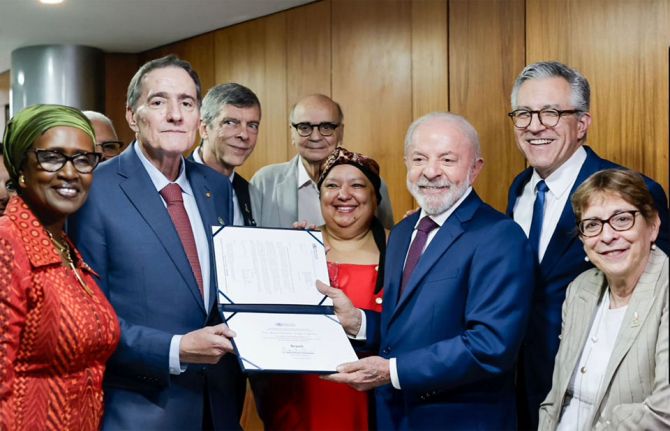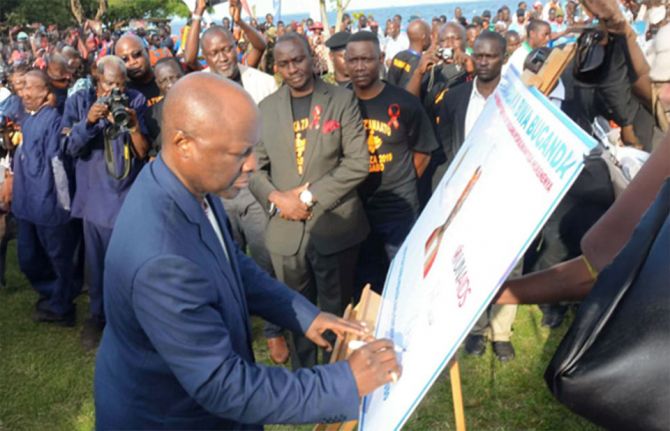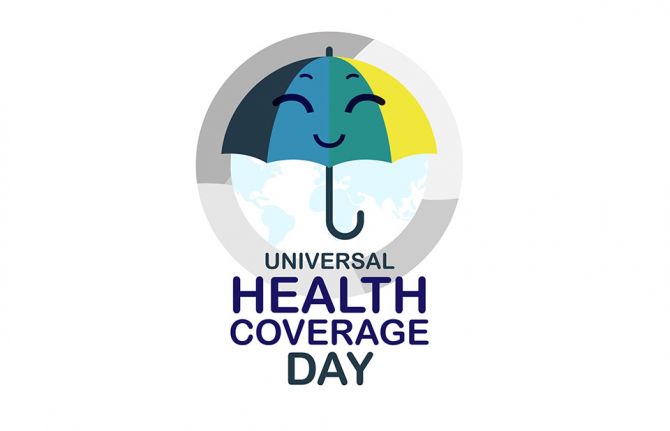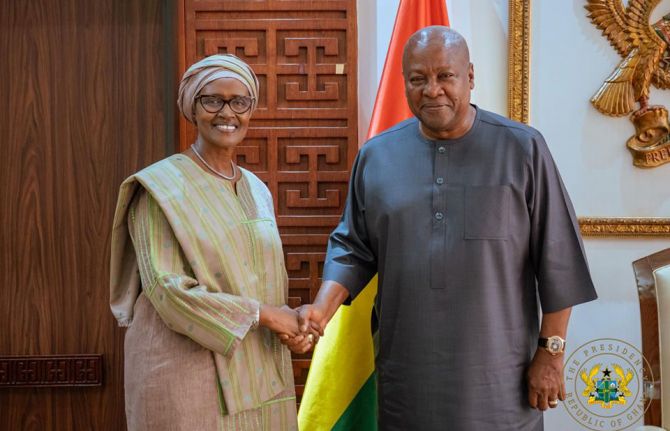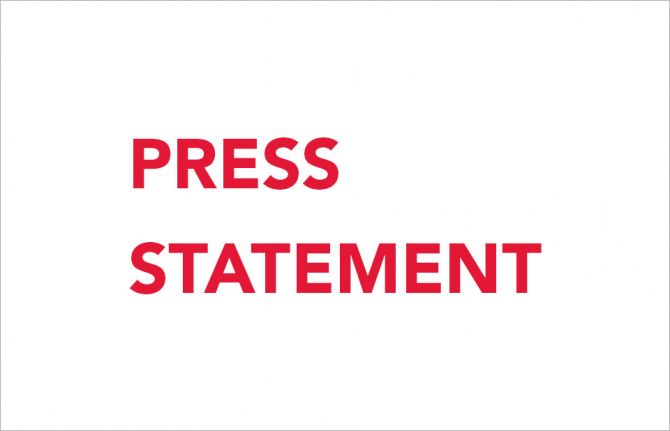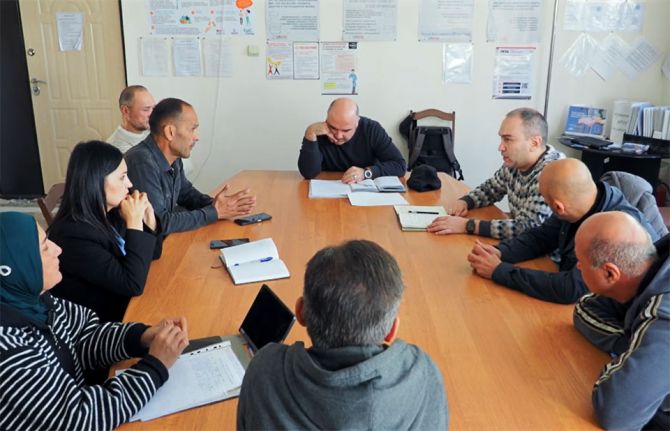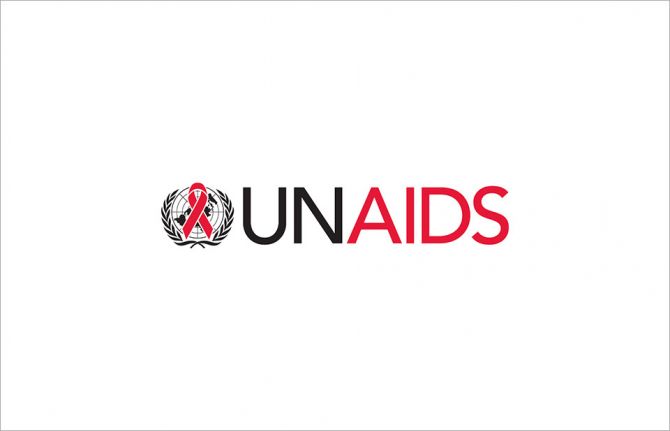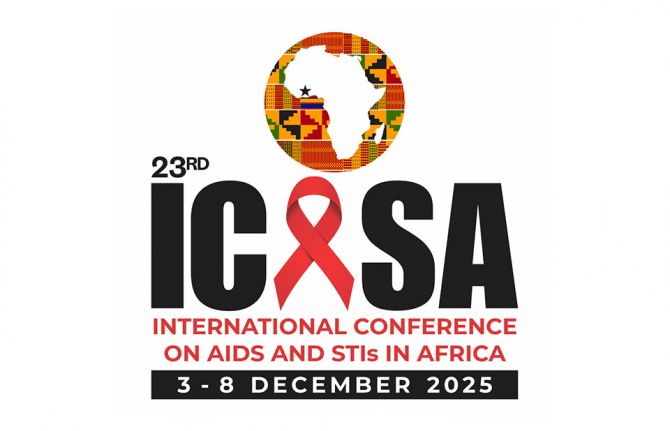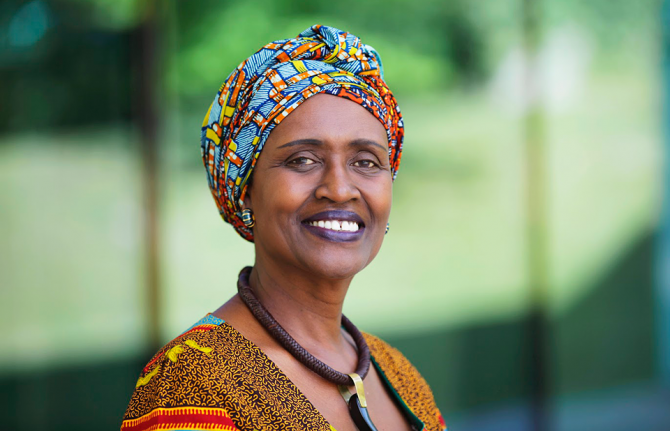
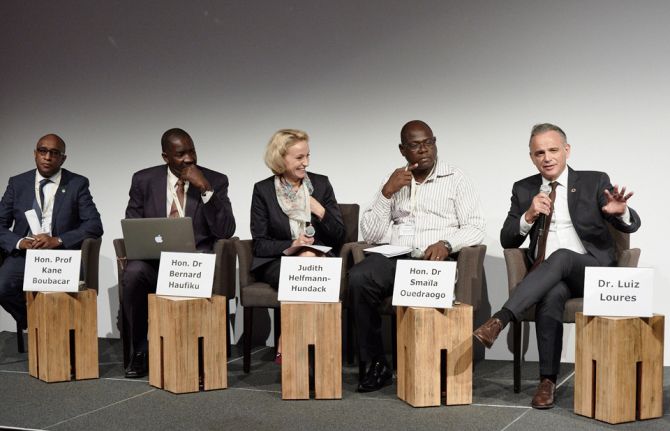
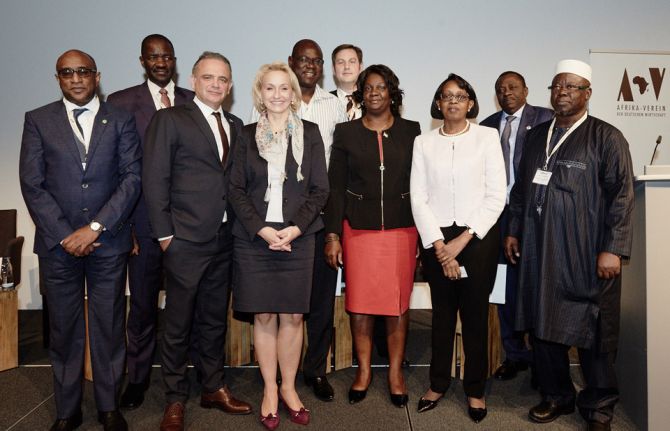
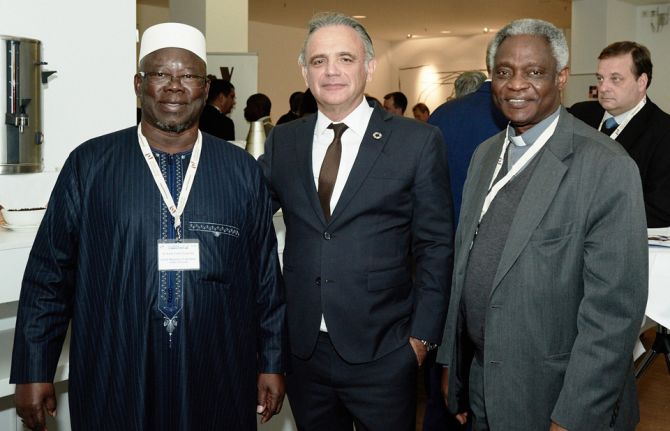
Debrief
Partnerships, investment and education highlighted at German–African Healthcare Symposium
14 October 2016
14 October 2016 14 October 2016Active collaboration between governments, civil society, faith-based institutions and private companies is essential in order to revolutionize and improve health care in Africa, according to participants in the third German–African Healthcare Symposium in Berlin, Germany. This work needs strong coordination and active advocacy from institutions such as UNAIDS, the symposium was told.
Representatives of German companies, faith leaders, ministers of health and academics gathered to explore ways to achieve the Sustainable Development Goals on health, which include as a target ending the AIDS epidemic by 2030.
The participants agreed on the need for significant innovation and partnership across a range of issues, including capacity development, access to services and strengthening systems for health. They also highlighted the active role played by faith-based institutions in the delivery of services and emphasized the importance of educating and empowering young people, women and girls in particular, while ensuring that no one is left behind in the response to HIV and other health needs.
Thomas Silberhorn, Parliamentary State Secretary in the German Federal Ministry of Economic Cooperation and Development, said that his government is actively looking for ways to encourage German companies to invest abroad. He reinforced to the many companies attending the event that trade alone was not sufficient and that it was necessary to actively invest in the health sector in Africa, including in education and professional training and in strengthening basic health services. While noting that Germany would not subsidize investment, he encouraged African countries to explore ways to increase their domestic health resources.
Roland Göhde, Chairman of the German Healthcare Partnership, also called for improved and increased training, education and capacity-building in Africa. Mr Göhde emphasized five areas of focus necessary to end the AIDS epidemic and reach the Sustainable Development Goals: communication, cooperation, coherence, coordination and culture.
UNAIDS Deputy Executive Director Luiz Loures described the AIDS response as a pathfinder that can help partners improve health-care overall. He noted the need for improved access by all people to essential services and that this relied on equity and human rights. This means finding ways to reach people and deliver health care where they live and work.
Participants
The event was attended by ministers of health from Burkina Faso, Cameroon, Mauritania, Namibia and Rwanda, and the Deputy Minister of Health of Sierra Leone, in addition to senior German political and private sector representatives.
Matshidiso Moeti, Regional Director for Africa at the World Health Organization, provided a keynote address following opening statements by Christoph Kannengießer, Chief Executive Officer of the German–African Business Association, and Roland Göhde, Chairman of the German Healthcare Partnership.
Faith-based institutions were represented by Cardinal Turkson of the Pontifical Council for Justice and Peace at the Vatican and El Hadj Cissé Djiguiba, Imam of the Grand Mosque of Abidjan.
UNAIDS Deputy Executive Director Luiz Loures provided a high-level outlook for the African health-care sector, while senior executives of German companies active in prevention, diagnostics, treatment and insurance joined in discussions with civil society, researchers and international organizations.
Key messages
- The participants called for active dialogue and collaboration among the diverse stakeholders.
- Private companies have a variety of roles to play, including logistics. For example, supermarket supply chains can also be used to improve the availability and lifespan of medical supplies and prevent theft.
- Governments rely on others to support HIV testing and counselling services.
- It is important for governments to be strategic and determine their own needs first, before seeking assistance, in order to avoid being distracted by new proposals.
Quotes
“THE ENGAGEMENT OF OUR ECONOMY HAS TO GO BEYOND TRADE. WE NEED INVESTMENT IN OUR PARTNER COUNTRIES, BECAUSE INVESTMENT IS THE ONLY WAY TO CREATE JOBS AND ENGAGE YOUNG PEOPLE AND ADMINISTRATIONS IN JOINT STRATEGY.”
“THE AFRICAN LANDSCAPE IS CHANGING AND WE NEED A NEW BUSINESS MODEL FOR ACCESS TO HEALTH CARE. WE NEED TO WORK WITH FAITH-BASED ORGANIZATIONS THAT DELIVER SERVICES. WE NEED TO WORK WITH COMMUNITIES TO UNDERSTAND THEIR NEEDS. AND WE NEED TO WORK WITH THE PRIVATE SECTOR TO EXPLORE NEW WAYS TO INNOVATE IN HEALTH.”
“A GENUINE DIALOGUE BETWEEN POLITICS, SCIENCE AND BUSINESS CAN ACHIEVE SIGNIFICANT RESULTS, BASED ON THREE PRINCIPLES: SOLIDARITY, SUBSIDIARITY AND A CONCERN FOR THE COMMON GOOD OF ALL.”
“WE HAVE TO SUPPORT OUR WIVES, OUR SISTERS, OUR DAUGHTERS, IN THE FIGHT AGAINST GENITAL MUTILATION, CHILD MARRIAGE AND FORCED MARRIAGE, AND WE HAVE TO INCLUDE YOUNG PEOPLE IN THE DEVELOPMENT OF OUR SOCIETIES. WE HAVE TO TALK TO THEM AND GIVE THEM INFORMATION ABOUT DISEASES.”
“PEOPLE CAN AFFORD A MOBILE PHONE, BUT THEY NEED TO BE CONVINCED WHY THEY SHOULD CONTRIBUTE TO HEALTH INSURANCE. NOW LESS THAN 20% OF OUR POPULATION IS COVERED BY HEALTH INSURANCE AND WE PROPOSE TO HAVE HALF COVERED WITHIN FIVE YEARS.”
“WE NEED TO REVIEW HOW WE SPEND BUDGETS AND USE AVAILABLE BUDGETS. WE SHOULD HAVE OUR OWN SOURCE OF FUNDING. WHEN SOMEONE IS HELPING TO CLEAN YOUR BACK, YOU SHOULD ALSO CLEAN YOUR FRONT.”
“WE REALLY NEED COMMUNICATORS AND COORDINATORS ON AN INTERNATIONAL LEVEL, LIKE UNAIDS, AND THEY SHOULD BE SUPPORTED MUCH STRONGER BY OUR GOVERNMENTS.”
“HEALTH CARE IS A GROWING MARKET. THE SUSTAINABLE DEVELOPMENT GOALS ARE AMBITIOUS, BUT THEY ARE ALSO AN OPPORTUNITY FOR COLLABORATION BETWEEN GOVERNMENTS, THE PRIVATE SECTOR AND CIVIL SOCIETY.”
Partners
Related

Debrief
Concrete actions needed to end the AIDS epidemic as a public health threat by 2030
10 October 2016
10 October 2016 10 October 2016Parliamentarians should collaborate worldwide to end the AIDS epidemic, according to the participants of the Ending the AIDS Epidemic as a Public Health Threat by 2030 workshop, which took place during the opening day of the World Health Summit in Berlin, Germany.
The workshop was organized by UNAIDS and the German Healthcare Partnership to bring together legislators, civil society, the private sector and academic leaders to explore ways to reach the Fast-Track Targets on ending the AIDS epidemic by innovating, accelerating and focusing their HIV programmes and policies.
In addition to political leadership, the session identified other essential factors necessary to meet the political targets agreed by United Nations Member States at the 2016 General Assembly High-Level Meeting on Ending AIDS and reviewed the latest progress in HIV diagnostics and treatment, investment and social engagement.
The participants also discussed how countries, cities and communities should prioritize their efforts to achieve the end of AIDS, what policy frameworks and innovative and alternative investment sources can be developed and utilized and how health systems can be strengthened to end AIDS and meet the Sustainable Development Goals without leaving anyone behind.
Participants
A broad spectrum of private sector, community, scientific and political representatives participated in the event, including UNAIDS Deputy Executive Director Luiz Loures.
Key messages
The participants called for a new network of like-minded politicians from across the political spectrum to take action on health and HIV. They emphasized the need to reflect local realities while making best use of scientific knowledge and tools for preventing new HIV infections.
The participants stressed the importance of keeping young women in school in order to avoid them acquiring HIV infection from older men and noted that key populations—including prisoners—must have unfettered access to HIV prevention tools.
The participants called on governments to actively involve the private sector in the response to HIV and stressed the need to empower UNAIDS as a coordinator and communicator. They warned that without sufficient investment there would be a resurgent and resistant HIV epidemic.
The participants noted the necessity of building greater trust in communities and exploring incentives for people to adhere to treatment and that newer technologies, such as self-testing, community-based testing and pre-exposure prophylaxis, were showing great promise.
They also noted that it is necessary to improve infrastructure and strengthen systems of health in order to ensure that people in need are supported and retained.
Quotes
“HIV IS A TEST. WE HAVE THE TOOLS, BUT WE DON’T REACH ENOUGH PEOPLE. IF WE DO NOT SUCCEED, IT QUESTIONS WHETHER WE WILL FAIL WITH OTHER DISEASES.”
“AIDS IS NOT OVER. WE LIVE IN A PARADOX, BETWEEN PROGRESS IN TREATMENT AND HAVING THE TOOLS, BUT AT THE SAME TIME SEEING THE RE-EMERGENCE OF NEW INFECTIONS. WE LOOK TO EVERYBODY INVOLVED, TO HELP FIND THE WAY TO RESOLVE THESE CHALLENGES.”
“WE CAN NEVER SEPARATE HUMAN RIGHTS FROM OTHER ISSUES. IT IS INTEGRAL TO PUBLIC HEALTH.”
“IT IS TIME FOR CONCRETE ACTION. WE HAVE BEEN TALKING FOR A LONG TIME. COMMUNITIES ARE WAITING FOR ACTION, IF WE REALLY WANT TO END AIDS AS A PUBLIC HEALTH THREAT BY 2030.”
“WE HAVE TO EXPLORE HOW TO RE-ENGINEER THE HEALTH SYSTEM AND ASSIGN FUNDING AGAINST THE GOALS, INCLUDING THE 90–90–90 TARGETS. WE SHOULD FOCUS ON THE QUALITY OF LIFE OUTCOMES.”
“WE MUST EMPHASIZE PREVENTION AND RESPONSIBILITY FOR PROTECTION OF SEXUAL PARTNERS.”
“IF THE WORLD DOES NOT MAKE THE INVESTMENT OVER THE NEXT DECADE, WE WILL HAVE A RESURGENT EPIDEMIC AND A RESISTANT EPIDEMIC.”
“OUR BELIEF HAS ALWAYS BEEN THAT, EVEN IF WE MAY NOT BE INFECTED BY HIV, WE ARE AFFECTED BY HIV.”
Related

Debrief
HIV, security and humanitarian emergencies in Africa
19 October 2016
19 October 2016 19 October 2016A high-level panel organized by UNAIDS and the Government of Togo and held on 14 October in Lomé, Togo, discussed HIV, security and humanitarian emergencies in Africa. The panel discussion took place in the margins of the African Union Extraordinary Summit on Maritime Security and Safety and Development in Africa.
There were more than 314 million people affected by humanitarian emergencies in the world in 2014, of which 67 million were forcibly displaced. An estimated 1.7 million people are living with HIV within these emergency contexts.
The meeting focused on the importance of implementing United Nations Security Council resolution 1983, on addressing the HIV response in conflict and emergency settings, increasing the focus, action and results on sexual violence and mainstreaming HIV in peacekeeping missions.
Special attention was directed towards the western and central African region, which is affected by many crisis and post-crisis situations and where only one out of three people living with HIV is accessing antiretroviral therapy.
Key messages
- The evaluation report of resolution 1983 should be discussed at the next United Nations Security Council meeting, in November.
- The HIV response should be strengthened in conflict and emergency settings and there should be more focus and actions to address sexual violence.
- HIV should be further incorporated in peacekeeping missions.
- People should be at the front and centre of the response, and no one should be left behind in the response to HIV in emergencies and conflicts.
- Humanitarian and development funding for HIV and gender-based violence prevention and response should be included in national HIV and humanitarian strategies.
- Human rights and dignity should be fully respected in all humanitarian emergencies.
Quotes
“We are very proud that our armed forces are very well represented in peacekeeping missions. We should also note that they are strongly engaged in the national AIDS response, but we look forward to scaling up the implementation of United Nations Security Council resolution 1983.”
“In Benin, a Manuel de bonne conduite has been developed. Since the early days of the epidemic, our soldiers have been tested before and after military interventions, and they are offered treatment in case they are found to be HIV-positive.”
“Unless we address HIV within security and humanitarian emergencies, we will not bring an end to the AIDS epidemic.”
“We apply systematic counselling on good conduct and zero tolerance on sexual abuse for our troops. This not only improves their efficacy but also the AIDS response.”
“AIDS is intricately linked with security. And for this reason, AIDS has been addressed at the highest level of the country’s authority.”
“The reality is that our countries are littered with arms, which are used to perpetrate sexual violence and abuse. What peace operations can do is not only promote equality in numbers, but also equitable access to HIV treatment and counselling.”
“The African Union Commission is thankful to all partners responding to HIV and supporting the realization of the revised health strategy 2016–2020.”
Region/country



Debrief
New HIV advocacy plan to strengthen the AIDS response in Chad
08 October 2015
08 October 2015 08 October 2015Strategic partners in the response to AIDS came together from 28 to 30 September in N'Djamena, Chad to develop a common strategy and an HIV advocacy plan for the UN system.
Participants acknowledged that political leadership and commitment at the highest level, including from the Head of State and the First Lady, has played a critical role in the response to AIDS. The country provides free access to HIV treatment for people living with HIV and 46% of its health facilities offer HIV services to prevent mother-to-child transmission of HIV.
Despite progress made in the country—the HIV prevalence rate has declined from 3.3% in 2005 to 2.5% in 2014—challenges still remain. According to participants, the major obstacles to the national AIDS response are the lack of resources, coordination of health activities at community level, and the management of health supplies.
The workshop proceedings and the strategic document will be presented at the meeting of the UN Country Team for Heads of Agencies’ approval. This is a unique approach epitomizing the One UN approach.
Participants
Funded by UNFPA, participants included representatives from all UN agencies working in the country and the core of national stakeholders (CCM, NAC, PMTCT, RNTAP+, France Expertise, PSLS, Ministry of Women’s Affairs, FOSAP, AMASOT, TB, etc.).
Miss Chad 2015 took part in the workshop where she made a presentation on the forum she is organizing in November 2015 to address the issues of youth’s and young women’s education on HIV.
Key messages
Based on the situation analysis, participants identified the following main areas of advocacy where the UN system should focus its efforts:
- Contribute to the scale up of HIV services to prevent mother-to-child transmission.
- Contribute to the improvement of the data input management system
- Contribute to the extension of the delegation of tasks in all health facilities and official community structures.
- Support the implementation of AIDS programmes among youth and adolescents.
- Support the increased involvement of civil society in the national AIDS response.
- Help reduce stigma and discrimination among people living with HIV.
- Help mobilize financial resources to support the national AIDS response.
Quotes
"The key to accelerating the national response to HIV is appropriate and tireless advocacy vis-a-vis national authorities, all stakeholders, day in and day out."
"Today it is not only AIDS that kills but so does stigma. Not fighting discrimination leads to more infections and more deaths.”
“Young women are particularly vulnerable to HIV. I wish and pray that AIDS is defeated in the near future.”
“The detailed advocacy strategic document you have developed for the whole UN system in Chad will enable us to undertake joint advocacy activities, avoid duplications, determine priorities, harmonize efforts and maximize impact in accelerating the national response to HIV.”
Region/country
Related

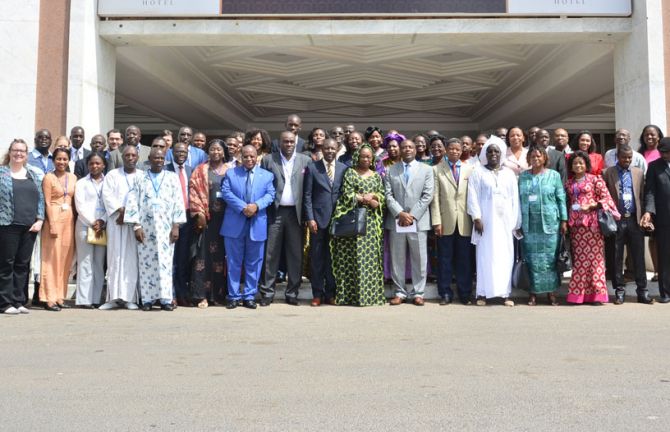
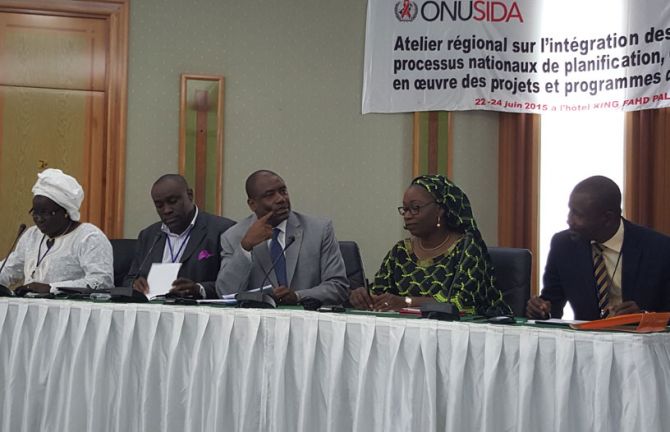
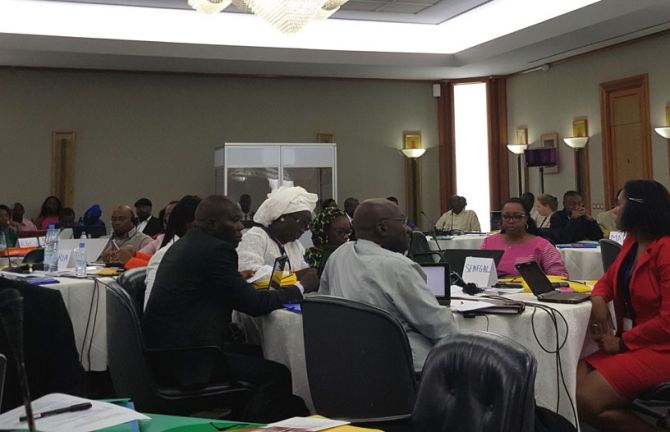
Debrief
Putting human rights and gender equality on the Fast-Track in Western and Central Africa
01 July 2015
01 July 2015 01 July 2015To support the capacity of countries to integrate human rights in their Fast-Track approaches to HIV programming, UNAIDS and the Alliance Nationale Contre le Sida (ANCS) Senegal held a three-day capacity building workshop in Dakar, Senegal from 22 to 24 June 2015.
The workshop highlighted the continued political, legal, cultural, social, and programmatic challenges that hinder efforts to address the HIV epidemic. Participants pointed out that existing programmes to address these challenges in Western and Central African countries remain largely insufficient and inadequate.
According to participants, human rights, gender equality and the involvement of people living with HIV and key populations are often cited in HIV planning documents. Yet, they are rarely translated into specific human rights programmes. And where these programmes are included in the national HIV planning documents, they are not addressed at the costing and budgeting phase, there are little metrics to track progress, and when implemented, these programmes are often not evaluated or taken to scale.
Participants
The workshop brought together more than 50 participants from 10 countries across Western and Central Africa including Burkina Faso, Cameroun, Chad, Côte d’Ivoire, the Democratic Republic of the Congo, Ghana, Guinea Bissau, Mali, Nigeria and Senegal.
Participants included decision makers and technical experts involved in HIV strategic planning at country level, officials from national AIDS commissions, Ministries of Health and Justice, people living with HIV and other key populations and community-based organizations. A wide range of technical and other partners including UNDP, the Global Fund to Fight AIDS, Tuberculosis and Malaria, the Office of the High Commissioner for Human Rights, the International HIV/AIDS Alliance and the Technical Support Facility for west and central Africa also participated in the workshop.
This workshop was the seventh and last in the series of regional workshops held since 2011, with support from the Ford Foundation.
Key messages
- Participants stressed the importance of the workshop in highlighting approaches and tools for ensuring the inclusion of programmes to advance human rights and gender equality.
- The workshop led to the elaboration by each country team of a national action plan with specific commitments to integrate human rights and gender programmes in their national AIDS response that clearly spells out partners and timelines for its implementation.
- The meeting concluded with the development and endorsement of the “Dakar Declaration on scaling up the HIV response, realizing the human rights and full access to services for everyone in West and Central Africa” in which participants committed to specific actions in their respective countries to advance evidence-informed and rights-based programmes in national HIV responses.
Quotes
“Unless the legal and social environments are protective of the people living with and vulnerable to HIV, people will not be willing or able to come forward for HIV prevention and treatment. Human rights need to be at the core of our Fast-Track efforts towards ending the AIDS epidemic in the region.”
“We have the ambition of achieving 90-90-90, ending new HIV infections and discrimination. Communities need to be at the helm and heart of it to succeed. Their voices, expertise and actions must be heard and supported.”
“The HIV response in West and Central Africa is at a critical stage. Human rights and gender issues remain among the key challenges in the response. Through the Dakar Declaration, we have committed to evidence-informed, gender sensitive and rights-based approaches to actions aimed at ending AIDS by 2030 in the region.”
Region/country

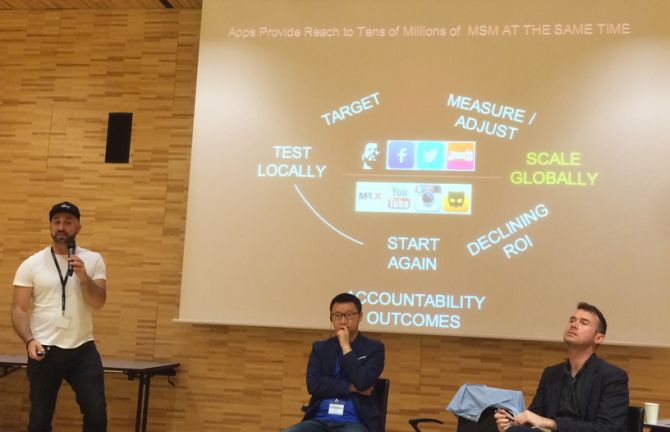
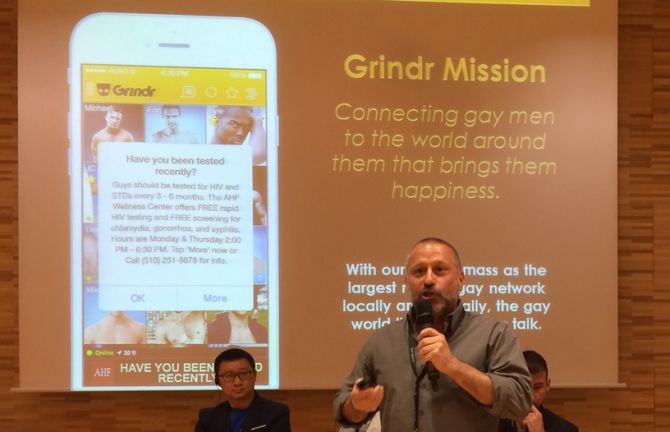
Debrief
Using new media for the health and well-being of gay men and other men who have sex with men
22 May 2015
22 May 2015 22 May 2015New information and communication technologies are changing the way in which gay men and other men who have sex with men meet their sexual partners. Today, men who have sex with men, including those who are not openly gay or who fear stigma, are able to arrange to meet other men, look for entertainment, find health information and mobilize through dating applications, the Internet and other digital media.
Such technologies also represent an important resource for extending the reach and enhancing the effectiveness of HIV prevention programmes among gay men and other men who have sex with men. They hold the potential to drive measurable programmatic improvements by collecting and disseminating information, linking virtual content to physical services and complementing offline components of HIV programmes.
In order to improve the reach of HIV services and the impact of HIV prevention programmes, UNAIDS, in collaboration with the Global Forum on MSM & HIV, the USAID funded LINKAGES programme and Health Policy Project, organized a consultation to develop a framework to engage the private and public sectors and communities in using new media technologies for HIV prevention among gay men and other men who have sex with men.
Participants
The participants included experts in the area of new media and HIV among gay men and other men who have sex with men, including some of the largest private companies that own dating platforms, programme implementers, researchers and advocates.
Key messages
- A number of large, for-profit, gay dating applications and Internet companies with a very large number of clients already support initiatives to foster the health and well-being of their clients. They have the potential to reach people at higher risk of HIV infection with information and refer them to HIV service providers.
- Public–private partnerships on new media technologies for the health of gay men and other men who have sex with men need to be strengthened. A better understanding of the strengths and limitations of the private and public sectors as well as community organizations and networks is required.
- Innovative projects are increasingly using new information technologies to strengthen the HIV response among gay men and other men who have sex with men across the project cycle, from planning to implementation to monitoring and evaluation. These need to be evaluated and scaled-up.
- National AIDS programmes need to increasingly include the use of new information and communication technologies in their strategies and policies, build their own information and communications technology capacity and fund such programmes.
- Data safety issues need to be addressed.
- The use of new media should be included in core HIV packages and programmes; international guidance should be developed regarding minimum standards, training requirements or measures of success.
Quotes
“It's encouraging to see the United Nations reach out to emerging technologies to discover ways that our platform may help stop the spread of AIDS in the world.”
“It’s a rare opportunity to have the private sector, implementers and community all in the same room—there has been loud and clear message from this meeting that we do have the same goals, we do have the same concerns and we do share common ground from which it is possible to move forward together.”
“The evidence that information and communications technology have significant reach and offer considerable potential for public health and HIV prevention, especially in the field of mobile apps, is extremely encouraging.”
“I was thrilled to be part of this important consultation on building effective public–private partnerships to address sexual health issues of gay, bisexual and other men who have sex with men. We look forward to working more closely with the United Nations to find meaningful solutions in reducing HIV/sexually transmitted infections across the globe.”
“Undeniably, gay social networking applications can be a great tool. Blued, as a gay dating application with social responsibility, is keen to make our platform available for HIV interventions. We just need to learn how to work more effectively and innovatively.”
Partners

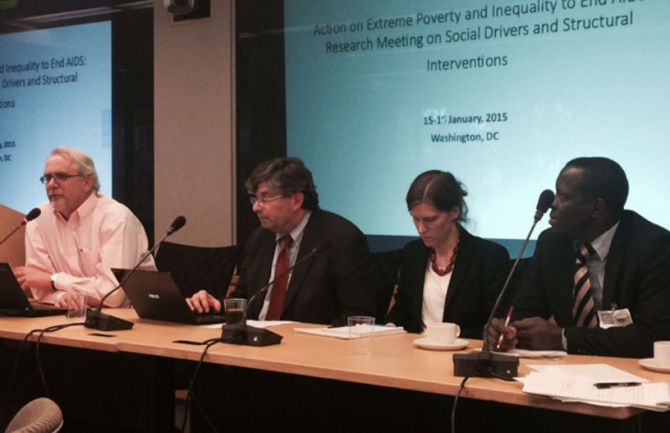
Debrief
Eliminating poverty and inequality and ending the AIDS epidemic
03 February 2015
03 February 2015 03 February 2015Leading academics, policy-makers and HIV and social protection experts met at the World Bank offices in Washington, DC, from 15 to 16 January to identify gaps in research and resources for ending poverty, inequality and the AIDS epidemic by 2030.
The meeting was convened by UNICEF, the World Bank, UNAIDS and Housing Works to find ways to eliminate existing social and structural barriers to accessing HIV services. The meeting brought together people working to end poverty and inequality and people working in the response to AIDS.
The participants highlighted that social protection programmes, including cash transfers in sub-Saharan Africa and parts of the Asia–Pacific region, emerged to mitigate the impact that HIV had among orphans and other vulnerable children and households affected by HIV. Such programmes focused on the vulnerabilities associated with HIV, including poverty, inequality and exclusion. Scaling up social protection programmes was recognized as essential for ending the AIDS epidemic by 2030.
Key messages
- The participants called for the scale-up and expansion of national social protection programmes focused on mitigating the vulnerabilities associated with HIV, including poverty, inequality and exclusion.
- Stronger social protection and HIV research is needed, utilizing impact evaluation approaches that capture the complexity and multisectorality of social protection.
- There is a need to explore new social protection and cash transfer programmes that address the specific HIV prevention needs of 19–24-year-old women, as most cash transfer programmes cease when women are around 19 years old, when they are most at risk.
- There is a need to develop sustainable social protection formulas and strategies that reflect the multiple benefits of social protection and cash transfer programmes.
Quotes
“For cash transfers to achieve widespread human development impacts, governments should ensure that the size of the cash transfers is at least 20% of the total consumption level of the target population.”
“Cash works for HIV prevention and treatment. Cash plus care works even better. We need to build more evidence on the benefits of the cash plus care equation.”
“Inequality is a key driver of new HIV infections. Brazil’s cash transfer programmes have shown us that inequality can be significantly reduced.”







